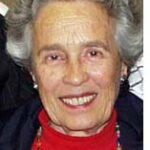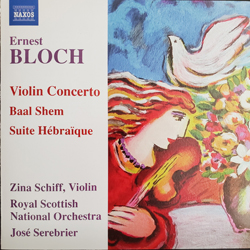
 SAN DIEGO —Isaiah’s words, “Comfort ye, comfort ye, my people“ began last Saturday’s Haftorah reading. It follows Tisha b’Av, which commemorates the destruction of the two Temples in Jerusalem and the expulsion of the Jews from Spain. Then, as now, we need comforting. Isaiah’s words remind me of the comforting power of music.
SAN DIEGO —Isaiah’s words, “Comfort ye, comfort ye, my people“ began last Saturday’s Haftorah reading. It follows Tisha b’Av, which commemorates the destruction of the two Temples in Jerusalem and the expulsion of the Jews from Spain. Then, as now, we need comforting. Isaiah’s words remind me of the comforting power of music.
At a concert commemorating Kristallnacht at New York City’s Cathedral of St. John the Divine, Maestro Jose Serebrier heard Zina perform as soloist with the the Brooklyn Philharmonic Orchestra.He introduced himself after the concert and they later met to discuss this CD project.
These works by Ernest Bloch reflect “the complex, glowing, agitated soul vibrating through the Bible.” The critics were unanimous in their praise.
France’s Classics Today wrote: “Here is a CD beyond one’s wildest dreams. Naxos has discovered in Zina Schiff an utterly remarkable violinist…In her interpretation of Bloch’s Concerto for Violin, which is rarely performed, there is a combination of emotional intensity and enchantment found nowhere else…the melodic power is matched by a rare spirituality which Zina Schiff and Jose Serebrier express with palpable fervor. One of the most beautiful Naxos CDs of 2007.”
Britain’s MusicWeb International selected the recording as the CD of the Month. “Hard to imagine a better modern version…Zina Schiff’s playing has an unbuttoned emotional intensity…her tone is glorious throughout.”
Germany’s magaizin.klassik.com notes, “Her playing is like a rhapsodic song that constantly varies…illuminated with improvisational charm, multihued sound in a skillful, colorful performance…No comparable performance of the Violin Concerto exists.”
The All Music Guide called the CD, “A wonderfully cohesive program brilliantly executed…Zina is a first-rate musician who can get inside the soul of Bloch’s extravagantly expressive music.”
Classics Today awarded the CD its 10/10 Highest Rating. “This is a wonderful disc. Zina Schiff plays this music with exceptional passion and commitment.”
Zina performed all the CD selections in San Diego, in recitals and with the San Diego Symphony Orchestra.
Ernest Bloch (1880-1959) was born in Geneva, Switzerland, the son of a watchmaker. An accomplished violinist, Bloch also displayed great talent as a composer. He was encouraged to compose by one of his violin professors, the great Belgium-Jewish violinist, Eugene Ysaye. Although Bloch became discouraged and reverted to working in his father’s clock shop, he managed to get his opera, Macbeth, produced by the Opera-Comique in Paris. This caught the attention of the famous novelist, Roman Rolland, who made a special trip to Geneva to meet Bloch and persuade him to devote himself to writing music.
Bloch first came to the United States in 1916 as music director of a dance troupe which went bankrupt and left him stranded. The following three years, he taught composition at the Mannes School of Music in New York City. After winning the Elizabeth Sprague Coolidge Prize for his Viola Suite, he became the director of the Cleveland Institute of Music, then moved west to become the director of the San Francisco Conservatory of Music. In 1930, San Francisco’s Congregation Emanu-El commissioned him to write the Sacred Service, allowing him to return to Switzerland, where he devoted himself totally to composition. It is during this time that he also wrote his violin concerto.
With Hitler’s ascent to power in neighboring Germany, and anti-Semitism spilling over into Switzerland, he decided to return to the United States in 1939. He taught on the music faculty of UC Berkeley before moving to Agate Beach, on the Oregon coast, where he spent the last seventeen years of his life.
I met Bloch’s grandson, Ernie Bloch, during one of my visits to my daughter, Harriet, in Portland, Oregon. Ernie was serving on the Board of Directors of the Jewish Museum in Portland, and the museum’s director, Judith Margles, a friend of my daughter’s, arranged for us to meet. I presented him with Zina’s Naxos recording of his grandfather’s works, which he was thrilled to receive.
While living in Agate Beach, the composer developed the hobby of polishing agates that he found along the shore. Ernie presented me with two of the polished semi-precious stones, one for Zina and one for me.
Harriet and I drove to Agate Beach to see the house where Bloch lived. It is on the National Registry. There is a short stretch of street by the house with the street sign, Ernest Bloch Lane.
Of course, it is his inspiring music which remains his greatest legacy. May these three excerpts from Zina’s Nazos CD bring you comfort during these troubled times.
Rapsodie from Suite Hebraique (track 7)
Eileen Wingard, a retired violinist with the San Diego Symphony Orchestra, is a freelance writer specializing in coverage of the arts. She may be contacted via eileen.wingard@sdjewishworld.com
This the first article I have read. A very insightful article and illuminating. I remember Zina playing from an early age, and was astounded by her talent.
Dan I too am disclosing that I am part of the family.
Judy
What a wonderful conclusion (at least for now) to the far-reaching, informative and, ultimately, inspiring set of articles by Eileen Wingard featuring the extraordinary artistry of her younger sister, Zina Schiff. I loved the story about Eileen and her daughter Harriet meeting Ernest Bloch’s grandson and exchanging gifts.
Full disclosure: I am the son of Eileen; Zina is my aunt; and Harriet is my sister. So, nu? I shouldn’t be proud? Thank you, mom, for your impressive achievement. Reading these articles has filled me with nachas, and the glorious music they contain has been a salve in this most trying of times. I look forward to many more such articles to come!
With all my love . . .
Your son, Dan.
Thanks Eileen for you r as always excellent article featuring the outstandng tallent of Zina and background on Ernest Bloch. ENjoyed hearing her renditions and feeling the mood of each piece.